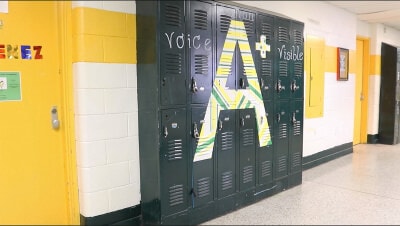

On the Monday after Thanksgiving, I made the 12-minute drive from my parents home just north of Lenoir, North Carolina to Hibriten High School. I followed the familiar shortcuts without a second thought, ultimately pulling into the same parking spot that I used all through my tenure at Hibriten, inadvertently avoiding the visitor parking spots from force of habit.
From the outside, Hibriten seemed relatively unchanged. The doors had a fresh coat of red paint, lights were up on the athletic practice fields, which had always been unusable after dusk, the landscaping seemed improved, but the building looked much as it had from 2000 until 2004 when I attended.
I have to imagine that the building looks much the same as when my sister attended in the 1980s.
The memories came rushing back as I walked toward the door: Watching the news on September 11th, 2001, bewildered by what was going on. My brief fling with Hawaiian shirts. Wrecking my first car in front of the high school two weeks after getting my license. Tailgating before football games in fall 2003 when we made a run at the state finals. Meeting people who to this day are my best friends. First crushes. First love — or an approximation of it.
As a high school student, I can remember looking at our teachers and thinking they would always be part of Hibriten. Much like the child who imagines that his or her parents will always be around — ageless, timeless protectors forever. Of course, those are the common thoughts of youth, when we are untouched by loss.
As I walked the halls of Hibriten, I was surprised when I peeked in familiar windows to see unfamiliar faces. I had assumed that Mrs. Cox would be teaching English forever. I had guessed that Dr. Simmons would break out his projector and display notes on United States history far into the future.
The departure of beloved teachers is part of the cycle of life for a school. The same goes for new teachers and staff arriving. Sally Beck, a guidance counselor at Hibriten, has been a friend from high school forward, and I must admit that I never expected to sit across from her in the counselors office.
Sally was my tour guide for the day, and as our steps echoed through the halls I saw other changes afoot: New MacBooks in graphics class, Chromebooks sitting on the desks of students hard at work, few textbooks in sight, and even a new auxiliary gym that sits in the location of the trailer where my fellow students facing suspension used to traipse to their punishment.
The changes were not all cosmetic, technological, or staffing in nature. After I graduated, I would occasionally hear of unspecified challenges that Hibriten had faced, but I must admit that I did not follow the story of my high school closely.
David Colwell, the current principal of Hibriten, joined the tour and walked me through the changes that have hit Hibriten since our class departed.
The Great Recession hammered an already economically devastated area even further. Students eligible for free and reduced-price lunch rose from 35 percent to more than 50 percent in fewer than five years without the school being rezoned. Today, the free and reduced-price lunch eligibility percentage is above 60 percent. Such a dramatic increase in the amount of students facing economic disadvantages created turmoil throughout the school.
The number of Advanced Placement courses declined, cuts in school funding hammered the infrastructure further, and teacher turnover created a negative impact on the school. In terms of achievement, Hibriten High School declined from the best performing of the three high schools in Caldwell County to the worst.
Mr. Colwell had spent much of his career at urban high schools with higher poverty rates, making him well suited to lead a school that had seen a rapid increase in economically disadvantaged students. When Colwell assumed the leadership of Hibriten, he immediately went to work on implementing strategies for at-risk students, including case management teams that featured counselors and nurses. He pulled all of the staff together to show them the sobering statistics — most staggering of all were the rapid increase in students who qualified for free and reduced-price lunch and the decline in graduation rates.
And the staff went to work.
Under the leadership of Colwell and his administration, and through the hard work of the staff, Hibriten High School’s graduation rate is back above 90 percent. Last year was also the best year for scholarship dollars in the history of the school, with the graduating class earning $3.1 million in aid. Next year they will have 15 AP classes — a record for the school.
And now the administrative staff is looking to the future. They are focused on trying to recruit teachers who will stick around as Colwell and other senior leaders depart.
“We are looking for teachers who students will remember,” Colwell said. “Teachers who will meet a new student and the student will know that they taught their big brother or sister. That kind of continuity matters.”
They also hope to be one of the first high schools, if not the first high school, to launch an Asian Studies program. Colwell beamed as he said, “Imagine it. This area was hit hard by jobs leaving for Asia, the economy is global in scale, and our graduates will be better prepared for that kind of world.”
Colwell’s vision for the future, his sense of how to guide the present, and his recognition of the importance of the past all seemed to guide his leadership.
He’s especially cognizant of history since Hibriten will celebrate its 50-year anniversary in 2016. This hit home for me during a conversation we had about how to honor those students who died while in school. It was yet another reminder of a lesson I’ve heard over and over as I traveled the state during my first six months with EdNC — people, and leadership, matter deeply.
As I walked out of the school, I thought back to the last 11 years since I left Hibriten. When I looked back at the building that has changed so little since 2004, I was reminded that the beginning of adulthood occurred within those walls, I was reminded of how much the teachers I had during those years shaped my life, and I was reminded of how much my own life has changed. Love found. Love lost. Friends paralyzed. Tragic loss. I’ve worked in politics, nonprofits, professional football. I’ve learned so much, even as I have so much left to learn.
I know now that our schools shape us beyond test scores, because I am still learning from people I met within those walls. As long as leaders like Mr. Colwell understand that people are at the core of Hibriten, my alma mater will be in good hands.


